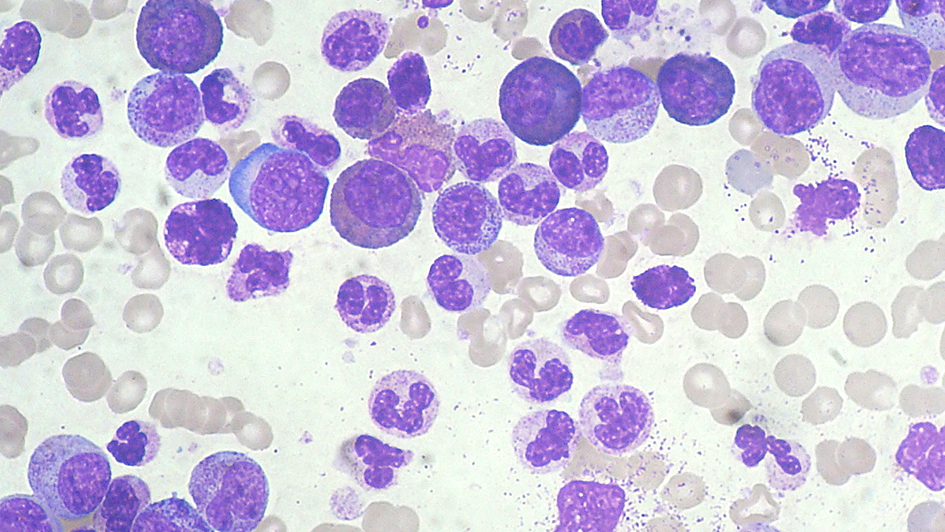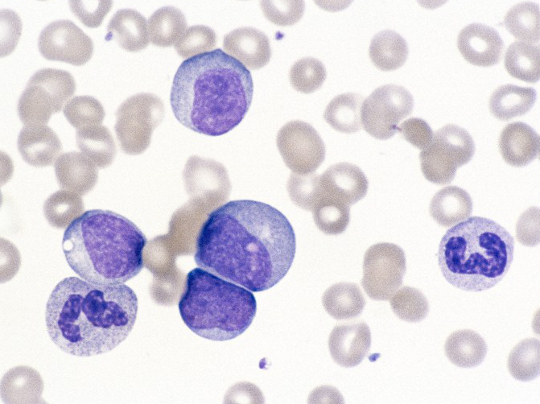
Image: Chronic myeloid leukemia smear. Credit: Paulo Henrique Orlandi Mourao. Source: WikiCommons (CC BY-SA 3.0 licence)
The largest ever study of its type is the first to definitively show an increased risk of blood cancers in relatives of patients.
A team led by scientists at The Institute of Cancer Research, London, and the German Cancer Research Centre in Heidelberg have uncovered new evidence, supporting a role for inherited genetic changes influencing the risk of developing diseases that arise from myeloid cells.
In the future, the results could help to identify people most at risk of these diseases, where genetic testing, medical observation and counselling could be beneficial.
They could also lead to new research that uncovers genetic causes of myeloid cancers.
Research at the ICR is underpinned by generous contributions from our supporters. Find out more about how you can contribute to our mission to make the discoveries to defeat cancer.
60 years of data analysed
Myeloid cells are a group of cells produced in the bone marrow, which in normal circumstances specialise into cells of different types.
Genetic errors in these cells can lead to cancers and other diseases including acute and chronic myeloid leukaemia, the myeloproliferative neoplasms polycythemia vera, essential thrombocythemia and myelofibrosis, and myelodysplastic syndrome.
Dr Amit Sud from the Molecular and Population Genetics team, working with colleagues from Germany and Sweden, published their findings in the journal Blood.
They analysed information about every patient diagnosed with myeloid diseases in Sweden over the last 60 years, comparing the occurrence of myeloid-type cancers and related diseases among more than 35,000 patients and 93,000 family members, against cases diagnosed among the general population.
People with more than one family member diagnosed with the myeloid diseases were around twice as likely to develop them as those with no family history, the study showed.
The risk varied depending on the type of disease.
The risk of developing acute myeloid leukaemia, for example, is likely to be around one-and-a-half times more for a first-degree relative of a patient than someone not related to a patient, the study showed.
The familial risk for some diseases was higher.
Inherited genetics traits
A first-degree relative of someone with myelodysplastic syndrome had around a seven-fold risk of developing it compared to someone from the general population.
Having a parent diagnosed with the disease at a relatively young age was also an indicator of higher risk for relatives.
Across all the disease types, two or more cases of myeloid diseases in a family increased the risk of first-degree family members developing the disease by up to five times.
The research shows that risk of myeloid cancers is passed on through families. This risk is likely to be mostly down to inherited genetic traits passed on in DNA – but environmental factors shared in families could also play a role.
The study was largely funded by German Cancer Aid and the Swedish Research Council, with additional funding from Bloodwise.
Identifying people at higher risk
Study lead author Dr Amit Sud, Clinical Research Fellow at the Institute of Cancer Research, said:
"Our study provides evidence for inherited genetic changes increasing the risk of blood cancers that develop from myeloid cells.
"In the future, our findings could help identify people at higher risk than normal because of their family background, who could be prioritised for medical help like screening to catch the disease earlier if it arises.
"Our study provides the strongest evidence yet for inherited risk for these diseases – evidence that has proved evasive before in part because these cancers are relatively uncommon, and our ability to characterise these diseases has, until recently, been limited."
